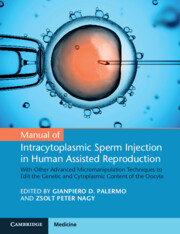 Manual of Intracytoplasmic Sperm Injection in Human Assisted Reproduction
Manual of Intracytoplasmic Sperm Injection in Human Assisted Reproduction Published online by Cambridge University Press: 02 December 2021
ICSI is a well-established insemination method in IVF due to its overall efficacy and reliability, even when severe male factor is not the main cause of infertility. Although conventional-ICSI provides high fertilization rate, it suffers from some technical drawbacks. Sudden or delayed oocyte degeneration may occur after ICSI even when performed by experienced embryologist and extreme care is applied during the injection phase. Preliminary results from studies conducted in early 2000s suggest that laser-assisted micro-drilling of the zona pellucida before injection (LA-ICSI) may be useful to make ICSI more successful when inseminating oocytes more prone to fertilization failure. Although this condition does not affect many couples, in case of degeneration of all the injected oocytes the IVF cycle must be cancelled. In these cases, LA-ICSI becomes a valuable option that deserves consideration.
To save this book to your Kindle, first ensure [email protected] is added to your Approved Personal Document E-mail List under your Personal Document Settings on the Manage Your Content and Devices page of your Amazon account. Then enter the ‘name’ part of your Kindle email address below. Find out more about saving to your Kindle.
Note you can select to save to either the @free.kindle.com or @kindle.com variations. ‘@free.kindle.com’ emails are free but can only be saved to your device when it is connected to wi-fi. ‘@kindle.com’ emails can be delivered even when you are not connected to wi-fi, but note that service fees apply.
Find out more about the Kindle Personal Document Service.
To save content items to your account, please confirm that you agree to abide by our usage policies. If this is the first time you use this feature, you will be asked to authorise Cambridge Core to connect with your account. Find out more about saving content to Dropbox.
To save content items to your account, please confirm that you agree to abide by our usage policies. If this is the first time you use this feature, you will be asked to authorise Cambridge Core to connect with your account. Find out more about saving content to Google Drive.